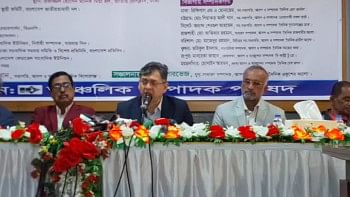64pc women face violence in cyberspace

At least 64 out of every 100 women in Bangladesh encounter violence in cyberspace, resulting in severe mental health consequences for the majority of the victims, speakers told a policy dialogue yesterday.
The violence women face include receiving sexually suggestive comments and explicit pictures through online messaging platforms, they mentioned at the dialogue titled, "#Unite: Investing to secure the cyberspace for Women and Girls".
The United Nations Development Programme organised the discussion in association with The Daily Star, Australian AID, and ICT Division of the government at the capital's BICC.
The speakers also emphasised that adequate investment is necessary to safeguard women and girls in cyberspace through public-private sectors' collaboration, aiming to bridge the ongoing gender digital divide, provide access to educational resources, and promote economic empowerment.
UNDP's gender team leader Sharmin Islam underscored the importance of individuals sharing their experiences of sexual violence and emphasised that this approach not only raises awareness but also plays a crucial role in identifying solutions to overcome this challenge.
Sonali Dayaratne, UNDP's deputy resident representative of Bangladesh, stressed that online violence not only impacts survivors' personal lives but also hinders their engagement in economic activities, politics, journalism, and activism, affecting broader societal and socio-economic development.
"Only 53 out of 190 countries have enacted criminal penalties for cyber harassment, signalling the need for greater efforts globally and at the country level," she said.

Stressing the importance of enhanced collaboration, she called for coordination among diverse UN agencies and organisations dealing with the issue.
Abu Sayed Md Kamruzzaman NDC, director general of the Digital Security Agency of the ICT Division, said if someone dials Bangladesh's National Service Access Helpline number 333 for any support related to online violence, the call will redirect to 3338 where necessary assistance will be ensured.
"Additionally, adolescents have the option to reach the toll-free number 13219, operated by the Cyber Teens Foundation, to report incidents of sexual violence involving teenagers. Individuals can also call on behalf of teenagers to seek assistance," he also said.
Efforts are underway to launch other helplines and an app aimed at monitoring the activities in district, upazila, and union levels to prevent cyberbullying, he added.
Farida Yasmin, additional DIG of Highway Police, urged everyone to contact the Facebook page of Police Cyber Support for Women to report incidents of online violence.
She also stressed for enhancing knowledge among justice sector actors and survivors, due to the sensitive nature of these issues, as many individuals dealing with such cases often find themselves confused.
Dr Helaluddin Ahmed, associate professor of Child, Adolescent, and Family Psychiatry at the National Institute of Mental Health, advocated for an integrated helpline interconnected with various departments.
He also stressed the importance of having mental health counsellors with the helplines and ensuring their sustainability, and urged families to cultivate mutual respect and bonding as a preventive measure for the ongoing situation.
Nardia Simpson, deputy high commissioner of Australia in Dhaka, highlighted the importance of cultural change and initiating conversations about safe cyberspace within families.
Advocate Shahreen Tilottoma, UNDP programme officer, moderated the dialogue.
The event also featured an impactful clothing exhibition, titled "Dress is not consent. #No Excuse," showcasing the attire worn by survivors of sexual violence during their ordeals.
The display showcased typical clothing worn by women in Bangladesh, like kameez, saree, and burka, debunking the myth that women's dresses provoke sexual violence.


 For all latest news, follow The Daily Star's Google News channel.
For all latest news, follow The Daily Star's Google News channel. 



Comments